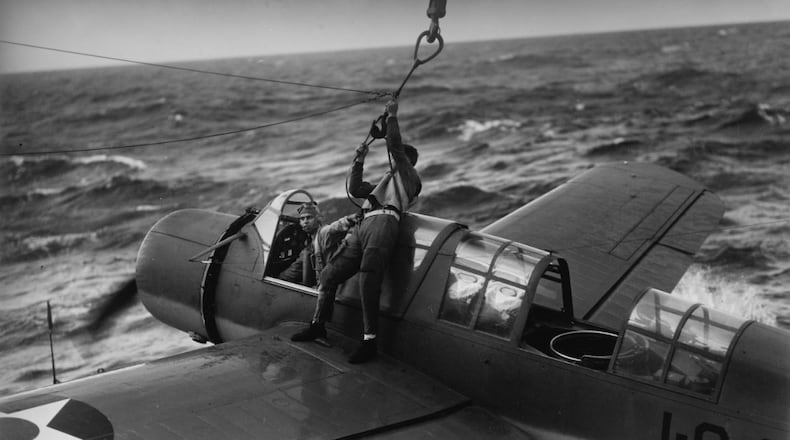The first Butler Countian who died in the line of duty did so in the opening minutes of the attack on Pearl Harbor. Ensign Lawrence “Junior” Williams was a pilot of one of the scout planes onboard the battleship Arizona. Ensign Williams was a 1932 graduate of McGuffey High School in Oxford and Miami University, class of 1936.
Credit: James Krause
Credit: James Krause
Williams enlisted in the U. S. Navy in May 1940. His last trip home to Oxford had been in May 1941. Although the exact manner of his death in the inferno that consumed the battleship Arizona is unknown, today he remains entombed along with 1,776 of his fellow shipmates at the bottom of Pearl Harbor.
In 1943, an aircraft hangar at the Miami University airfield would be named in his honor. The Coulter-Williams post of the American Legion in Oxford was named in part for him. Ensign Williams’ widowed mother would continue to reside in Oxford at 304 W. Church St. for many years afterwards. Before the end of WW2 in September 1945, Ensign Williams would be joined by an additional 346 Butler County residents who lost their lives in the war along with a further 400 wounded in action.
More than 16,000 Butler County men, including 8,161 drafted from Hamilton, would enter the armed services during the conflict. Starting in 1943, physically fit 18-year-old male high school seniors were drafted into the armed forces before the graduation of their high school class.
Due to the pressing need to produce armaments by various Hamilton industries, a few hundred older men who were skilled tradesmen, and had initially volunteered to serve in the conflict, were instead “frozen” in local manufacturing jobs considered vital to the war effort.
Daily life in Hamilton dramatically changed beginning later in December 1941. Rationing of nearly everything from food, gasoline, tires and yes, even liquor, became the norm as the war progressed. Rationing was so strict that permission had to be received from a local board to acquire an automobile.
By May of 1942 federal restrictions were in place limiting rail, air and bus transportation. Factories in the city ran virtually flat out during the war. In 1942 all holidays, with the exception of Christmas day were cancelled.
Jim Krause writes occasional history columns for the Journal-News and may be contacted by email at jdkrause@fuse.net.
About the Author



